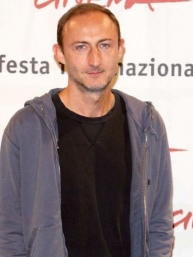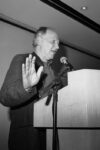 The broad outlines of the story are known — during a 2011 book tour for The Map and the Territory Michel Houellebecq disappeared for a week or so. As is often the case with Houellebecq, intense media attention followed and rumors swirled. The most extreme version had the author kidnapped by al Qaeda as a punishment for his public statements on Islam. This, we now know, was not true, though Houellebecq’s statement that he simply forgot about the engagements didn’t bring the story to any type of resolution.
The broad outlines of the story are known — during a 2011 book tour for The Map and the Territory Michel Houellebecq disappeared for a week or so. As is often the case with Houellebecq, intense media attention followed and rumors swirled. The most extreme version had the author kidnapped by al Qaeda as a punishment for his public statements on Islam. This, we now know, was not true, though Houellebecq’s statement that he simply forgot about the engagements didn’t bring the story to any type of resolution.
Into this space enters Guillaume Nicloux, director and occasional collaborator with Houellebecq whose new film, The Kidnapping of Michel Houellebecq, made its American premier at the Tribeca Film Festival. The film has Houellebecq playing himself as the target of kidnapping by unexplained forces. It’s a funny film though, a kidnapping without the threat of violence, a playful representation of its protagonist given the heaviness that often comes with his public presence.
I spoke with Nicloux in New York the day after the film’s American premier. We discussed the conception of the project, Houellebecq’s place in the history of French literature, and reverse Stockholm Syndrome.
[Note: This interview was originally conducted in French. Some translation assistance was provided by Camille Neel.]
The first question concerns the character of Michel. In The Map and the Territory he inserts himself as a character, as a somewhat exaggerated and grotesque version of his media image . . .
I haven’t read the novel.
You haven’t?
In fact it’s not Michel Houellebecq who interests me, but rather Michel Thomas [his real name]. It’s the human, not the writer. I’m not interested at all in the writer. For the film, it’s the human being that interests me, thus, for me, what is important is to show the humanity of Michel, not the writer who is known by way of the media — as a provocateur, who creates lots of rumors and provocations. What I wanted to show is the humanity of Michel — his weakness, his humor, his nastiness, all that speaks to the human, not the media figure. I wanted to show the most realistic and just vision of Michel’s personality, which is to say to get rid of the costume that the media always tries to make him wear.
It’s for that reason that his image is so different in the film. On television he is never funny, but in the film he is very funny.
And had you known him from before.
Yes, he acted in another film of mine, and we published a book together maybe 15 years ago.
Did you conceive the film after the period that he disappeared during his book tour?
No, it came to me after Michel had played a small role in a film that I directed [The Gordji Affiar] . . . and at that moment I started to think about how I might be able to construct an entire story that revolved around Michel, but not Michel Houellebecq the writer, but Michel Thomas, the real person.
In the film there is not much action . . .
You think so?
Yes.
But he boxes, he makes love, he drinks, he eats, he works and writes a little. I find that there are many people in the world who do much less than he does in the film.
Do you think his life in captivity is very different from what he would be doing otherwise in Paris?
I find that it’s very different because the life of Michel in Paris is very monotonous. It’s a life where he doesn’t see many people. It’s often a sad life, which he even says in the film. So what happens when he is kidnapped is that he’s given back a little taste for life. In that what it’s very different from his normal life because he meets people with whom he can exchange things that he’s never done before. There are many new things that come with his new life. He makes love with a young muslim woman, he drives 220 km/hr, he learns to box, and other things that he’s never done. He does all this in very few days. He drinks a lot, he has fits of anger, which is very surprising because you don’t see things like that in his normal life in Paris.
Are you familiar with the term Stockholm Syndrome?
Yes. That’s interesting because in the film what we see is the inverse of Stockholm Syndrome.
And where do you think his charm lies?
It’s maybe because physically he is very fragile. You can feel how much he is suffering at times, or that when we feel the need to drink a lot it is because we have something to forget. I think that the suffering is really moving for the audience and brings them to an empathy for the character and for the man.
However, he is also really annoying to the captors. He is always asking for wine and cigarettes, he asks for another visit from the prostitute, he is really tiresome for them. He gets angry. He begs our sympathy, but at the same time he behaves really badly.
How scripted was the film? Did you allow the actors to improvise or for Michel to decide what he was going to talk about in certain scenes?
I wrote the main through lines of the film and shot it in long sequences, for example whole meals were shot in one take with four cameras. The main thing is that there were some main topics to discuss, like Poland, Le Corbusier, Europe, MMA, and he needed to have these topics in place. But during the scenes I was interfering with some characters to ask them to say things without the others knowing what I was telling them, just to give some life to the discussion, to introduce a new angle.
Your last movie, The Nun (La Religieuse), was based on a Diderot novel. How much does literature serves as a motivator for your filmmaking?
For The Nun what motivated me was the writing, the literature of Diderot. For this film it was the speech of Michel. There are written words in one case and spoken words in the other, but in either case we are in a world where there are literary references everywhere.
And what do you think of Houellebecq as a writer?
The most important writer in France now is Houellbecq. For me he is in the same family as Celine, Jean Genet, or Julien Gracq, because they are provocateurs of a sort, but with a literature that disrupts your way of thinking. Those two things make him a particular kind of figure that the media loves, because they never know what he is going to say or do.
Did you go to the premier?
I only went to the Introduction and Q & A after.
Do you ever go to the premiers of your films?
No, never. When the director sees the film he doesn’t really see the film, he sees everything around the film, all the decisions that were made, all the mistakes, so there’s no pleasure in that. It’s not interesting to relive the moments of filmmaking. I’m amazed by directors who willingly go to premiers of their movies.
Michael Schapira is an Interviews Editor for Full Stop.
This post may contain affiliate links.







